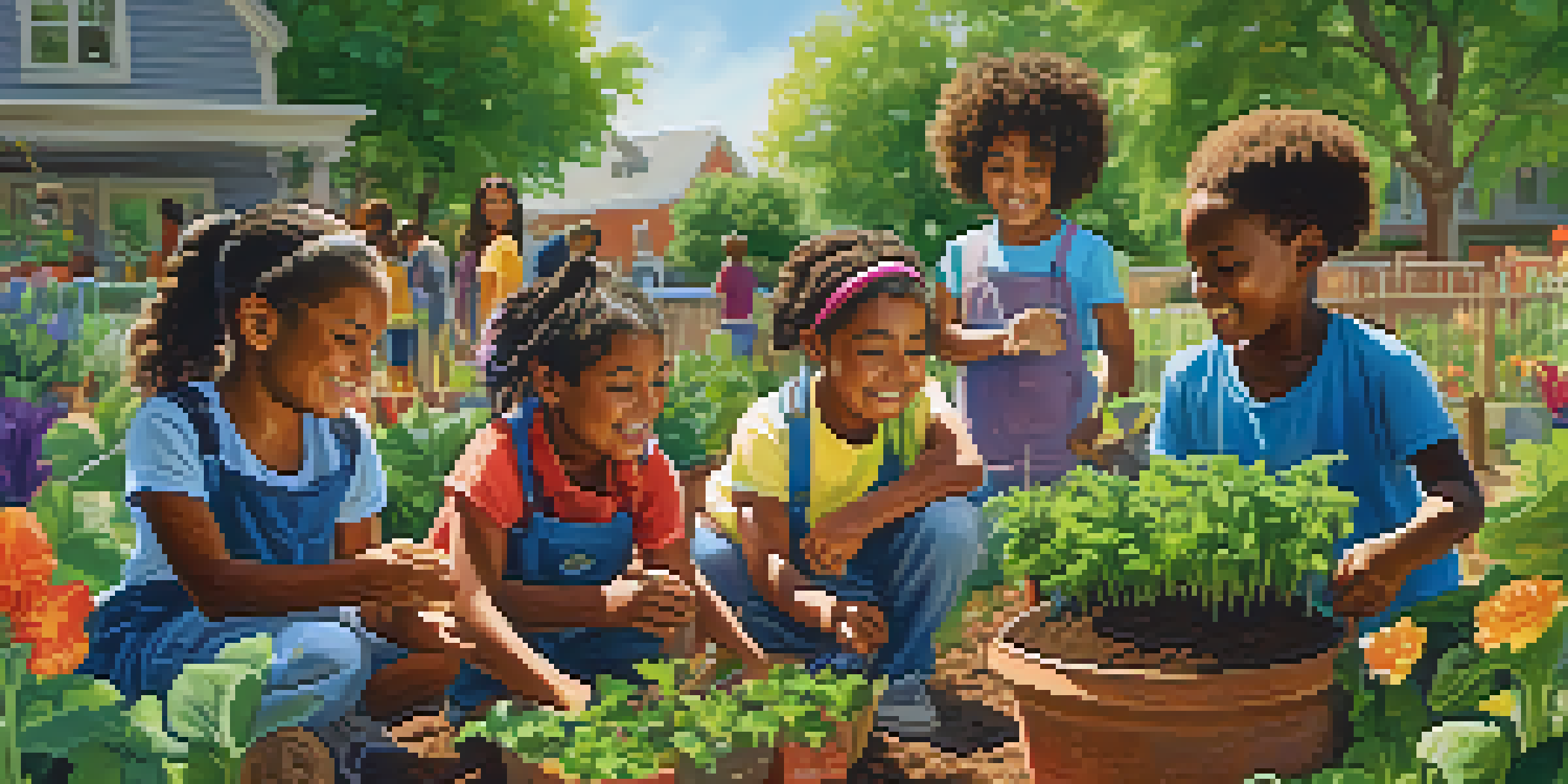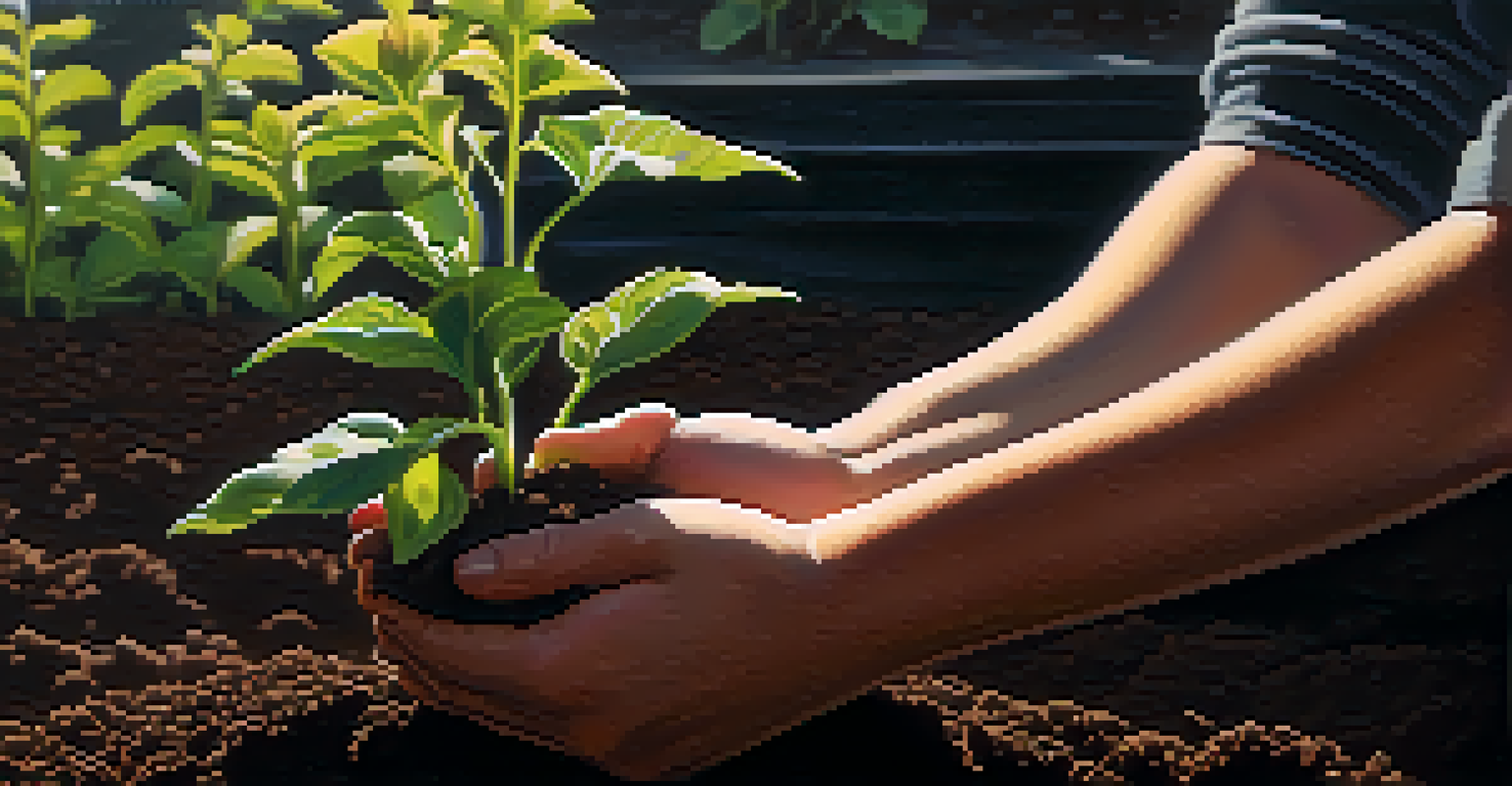Gardening as a Means of Fostering Emotional Intelligence in Youth

Understanding Emotional Intelligence in Youth Development
Emotional intelligence, often referred to as EQ, is the ability to recognize, understand, and manage our own emotions while also empathizing with others. For young people, developing EQ is crucial as it helps them navigate social situations and build healthy relationships. Gardening can be a unique and effective tool to foster this essential skill during formative years.
The greatest weapon against stress is our ability to choose one thought over another.
When kids engage with plants and nature, they learn to observe subtle changes, both in their surroundings and in themselves. This awareness can enhance their emotional literacy, allowing them to better identify their feelings and those of others. As they care for living things, they also learn empathy, a core component of emotional intelligence.
Through gardening, youth can practice patience and resilience, as they often face challenges such as pests or unfavorable weather. These experiences teach them to cope with disappointment and develop problem-solving skills, both of which are vital for emotional growth.
The Therapeutic Benefits of Gardening for Young People
Gardening is not just about growing plants; it's also a therapeutic activity that can significantly enhance mental well-being. When youth spend time in nature, they experience a reduction in stress and anxiety levels. This calming effect allows them to process their emotions more effectively, leading to improved emotional regulation.

Engaging in gardening tasks, such as planting seeds or watering plants, provides a sense of accomplishment and boosts self-esteem. As young gardeners see their efforts blossom into vibrant flowers or lush vegetables, they gain confidence in their abilities, which translates to other areas of their lives.
Gardening Boosts Emotional Intelligence
Engaging with gardening helps youth develop emotional intelligence by enhancing their empathy, patience, and problem-solving skills.
Moreover, gardening promotes mindfulness, encouraging youth to stay present in the moment. This practice can help them feel more grounded and connected to their emotions, fostering a deeper understanding of themselves and their reactions to various situations.
Building Empathy Through Group Gardening Activities
Group gardening activities offer a fantastic opportunity for youth to work together towards a common goal. In these collaborative settings, they learn to communicate effectively, share responsibilities, and support one another. This teamwork is vital for developing strong social skills and enhancing emotional intelligence.
The best way to find yourself is to lose yourself in the service of others.
As they share the joys of nurturing plants and overcoming challenges together, young people naturally cultivate empathy. They learn to appreciate different perspectives and recognize the value of collaboration, which is essential for building strong relationships in the future.
Additionally, group gardening can lead to meaningful conversations about feelings, experiences, and challenges. These discussions create a safe space for youth to express themselves and listen to others, further deepening their emotional connections.
Gardening as a Lesson in Responsibility and Accountability
Taking care of a garden requires responsibility and accountability, two traits that are essential for emotional intelligence. When youth are entrusted with the care of plants, they learn the importance of nurturing and following through on commitments. This sense of responsibility can translate into other aspects of their lives, such as schoolwork and friendships.
As they witness the direct consequences of their actions—whether plants thrive or wither—young people gain insights into cause and effect. This understanding can lead to a greater awareness of how their choices impact their emotions and those of others, fostering accountability.
Nature Reduces Stress and Anxiety
Spending time in nature through gardening significantly lowers stress levels, allowing young people to process their emotions more effectively.
Moreover, the act of nurturing living things teaches youth about the value of patience and perseverance. They learn that not every effort will yield immediate results, and that consistent care is necessary for growth. These lessons in responsibility and accountability are foundational for emotional maturity.
Enhancing Problem-Solving Skills Through Gardening Challenges
Gardening is filled with unexpected challenges, from pesky pests to unpredictable weather. These hurdles provide an excellent opportunity for youth to develop problem-solving skills. When faced with a gardening issue, young people must think critically and creatively to find solutions, fostering resilience and adaptability.
This hands-on experience teaches them that setbacks are a natural part of any process. Instead of feeling discouraged, they learn to approach problems with a positive mindset and a willingness to try again. This resilience is a key aspect of emotional intelligence, as it helps them navigate life’s ups and downs more effectively.
Additionally, discussing the challenges they encounter in gardening can promote emotional growth. Sharing their frustrations and victories fosters a sense of community and encourages open dialogue about feelings, further enhancing their emotional intelligence.
The Role of Nature in Enhancing Emotional Awareness
Nature has a unique way of grounding us and enhancing our emotional awareness. When young people spend time in a garden, they become attuned to the rhythms of the natural world, which can mirror their own emotional experiences. This connection to nature can be a powerful tool for self-reflection and emotional understanding.
As they observe the changing seasons, young gardeners can draw parallels to their own emotional fluctuations. The cycle of planting, nurturing, and harvesting can serve as a metaphor for growth and change in their lives, reinforcing the idea that emotions are natural and ever-evolving.
Group Activities Foster Connection
Collaborative gardening activities promote teamwork and meaningful conversations, strengthening emotional bonds among young people.
Furthermore, the sensory experience of gardening—feeling the soil, smelling the flowers, and hearing the rustle of leaves—can heighten their emotional awareness. Engaging the senses in this way allows youth to connect more deeply with their feelings, promoting a greater understanding of themselves.
Creating Lasting Connections Through Gardening Experiences
Gardening can create lasting connections, not only among peers but also with family members and mentors. Working together in a garden fosters shared experiences that strengthen relationships and promote emotional bonding. These connections are vital for young people as they navigate their emotional journeys.
Moreover, the act of gardening can spark conversations about emotions, life lessons, and personal growth. These discussions can deepen understanding and empathy among individuals, creating a supportive environment that nurtures emotional intelligence.

As youth reflect on their gardening experiences, they often carry the memories and lessons learned into adulthood. The skills they develop in emotional regulation, empathy, and resilience will serve them well throughout their lives, making gardening a valuable investment in their emotional futures.